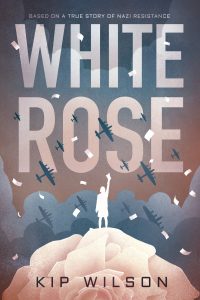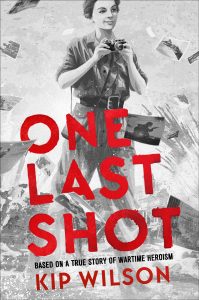Talking About Women’s History: Three Questions and an Answer with Kip Wilson
Kip Wilson is the author of critically-acclaimed young adult verse novels White Rose (Versify, 2019), about anti-Nazi political activist Sophie Scholl, The Most Dazzling Girl in Berlin (Versify, 2022), set in a queer club in Berlin during the last days of the Weimar Republic, and One Last Shot (Versify, 2023), about anti-fascist Spanish Civil War photojournalist Gerda Taro. Kip holds a Ph.D. in German Literature and spends her days as a Library Technician at the Concord-Carlisle Regional High School.
I’ve been looking forward to reading One Last Shot ever since Kip announced she was writing the book, and I am so pleased to have her back on the Margins to talk about it.
Take it away, Kip!
What path led you to Gerda Taro? And why do you think it is important to tell her story today?
I’ve long been interested in the interwar period (The Most Dazzling Girl in Berlin also takes place in the 1930s), and I’m married to a Spaniard, so I’ve been learning about the turbulent history of Spain at that time for a while. But I didn’t connect to a protagonist until August 1, 2018, when I saw an impish girl holding a camera on the Google Doodle. I clicked on the image right away of course, and was intrigued enough by what I saw about Gerda Taro at first glance that I quickly ordered several books about her and her more famous partner, André Friedman (aka Robert Capa).
Writing about a historical figure like Gerda Taro requires living with her over a period of years. What was it like to have her as a constant companion?
You know, it was pretty amazing. The more I knew her, the more I loved her. What a firecracker! I wish I could hang out with her, truly. But that’s not to say she was a perfect individual or had a fantastic life. She lived through incredibly difficult times and did what she had to do to survive. Photographs of her show a goofy personality, a thirst for adventure, and an unrivaled self-confidence I certainly wish I had. “What would Gerda do?” is certainly a question I sometimes ask myself since getting to know her that delivers much more interesting results.
What types of sources do you rely on to create rich fictional characters from obscure, or poorly documented historical figures?
Gerda Taro unfortunately falls into this category, because she left behind no surviving letters or diaries–just a single telegram! But I’m so lucky that many of Gerda’s photographs are available online through the International Center of Photography (ICP): https://www.icp.org/browse/archive/collections/gerda-taro-september-26-2007-january-6-2008. It’s amazing how much you can tell about Gerda from photographs of her as well as by her.
I’m also lucky that Gerda’s biographers were meticulous in their research–interviewing surviving friends and acquaintances when they were still alive, and digging deep in the archives to find all kinds of incredible historical details.
A question from Kip: Who or what initially sparked your interest in women’s history? I’m curious to hear what started you along this path.
One of my favorite things to do when I was small was curl up next to my grandmother and ask her, “What did you do when you were a little girl?” From there it was a short step to reading biographies about historical women who ignored social boundaries and accomplished things—the kind that are written with the intention of inspiring young girls. My grade school’s revolving library owned a whole series of them. Each volume started with the woman as a little girl who didn’t quite fit in. Every week a new one arrived and I snatched it before anyone else could get it, eager to read about Clara Barton, Madame Curie or Julia Ward Howe. They were undoubtedly whitewashed accounts of complicated lives, but I loved them.
***
Want to know more about Kip Wilson and her work?
Visit her website: kipwilsonwrites.com
Check out her Instagram account: @kipwilsonwrites.
***
Tomorrow it will be business as usual here on the Margins with a blog post from me. Then we’ll be back on Monday with an interview with Dr. Catherine Musemeche, author of Lethal Tide








